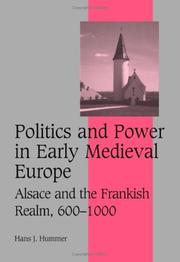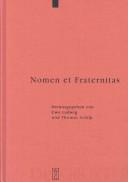| Listing 1 - 6 of 6 |
Sort by
|

ISBN: 9780521114486 0521854415 9780521854412 9780511497209 0511140746 9780511140747 0511139527 9780511139529 0511497202 0511140304 9780511140303 9780511139970 0511139977 1280309024 9781280309021 9786610309023 6610309027 0521114489 1107155118 9781107155114 0511312202 9780511312205 Year: 2005 Volume: 65 Publisher: Cambridge Cambridge University press
Abstract | Keywords | Export | Availability | Bookmark
 Loading...
Loading...Choose an application
- Reference Manager
- EndNote
- RefWorks (Direct export to RefWorks)
How exactly did political power operate in early medieval Europe? Taking Alsace as his focus, Hans Hummer offers an intriguing new case study on localised and centralised power and the relationship between the two from c. 600-1000. Providing a panoramic survey of the sources from the region, which include charters, notarial formulas, royal instruments, and Old High German literature, he untangles the networks of monasteries and kin groups which made up the political landscape of Alsace, and shows the significance of monastic control in shaping that landscape. He also investigates this local structure in light of comparative evidence from other regions. He tracks the emergence of the distinctive local order during the seventh century to its eventual decline in the late tenth century in the face of radical monastic reform. Highly original and well balanced, this 2006 work is of interest to all students of medieval political structures.
Alsace (France) --- Europe --- Politics and government. --- Politics and government --- History. --- Politique et gouvernement --- Histoire --- 476-1492 --- Political science --- Administration --- Civil government --- Commonwealth, The --- Government --- Political theory --- Political thought --- Politics --- Science, Political --- Social sciences --- State, The --- Région Alsace (France) --- Alsazia (France) --- Elsass (France) --- Alsatia (France) --- Alzacija (France) --- Alsace-Lorraine (Germany) --- Grand Est (France) --- Arts and Humanities --- History
Book
ISBN: 9780198797609 0198797605 0192518291 0191838969 Year: 2018 Publisher: Oxford Oxford University Press
Abstract | Keywords | Export | Availability | Bookmark
 Loading...
Loading...Choose an application
- Reference Manager
- EndNote
- RefWorks (Direct export to RefWorks)
What meaning did human kinship possess in a world regulated by Biblical time, committed to the primacy of spiritual relationships, and bound by the sinews of divine love? In the process of exploring this question, Hans Hummer offers a searching re-examination of kinship in Europe between late Roman times and the high middle ages, the period bridging Europe's primitive past and its modern future. 'Visions of Kinship in Medieval Europe' critiques the modernist and Western bio-genealogical and functionalist assumptions that have shaped kinship studies since their inception in the nineteenth century, when Biblical time collapsed and kinship became a signifier of the essential secularity of history and a method for conceptualizing a deep prehistory guided by autogenous human impulses. Hummer argues that this understanding of kinship is fundamentally antagonistic to medieval sentiments and is responsible for the frustrations researchers have encountered as they have tried to identify the famously elusive kin groups of medieval Europe.
Kinship --- SOCIAL SCIENCE / Discrimination & Race Relations. --- SOCIAL SCIENCE / Minority Studies. --- History --- Ethnology --- Clans --- Consanguinity --- Families --- Kin recognition --- Parenté --- Parenté
Book
Year: 1983 Publisher: Erlangen-Nürnberg
Abstract | Keywords | Export | Availability | Bookmark
 Loading...
Loading...Choose an application
- Reference Manager
- EndNote
- RefWorks (Direct export to RefWorks)
Book
ISBN: 2503596290 Year: 2022 Publisher: Turnhout, Belgium : Brepols Publishers,
Abstract | Keywords | Export | Availability | Bookmark
 Loading...
Loading...Choose an application
- Reference Manager
- EndNote
- RefWorks (Direct export to RefWorks)
Explores the formation of local and universal cultural dynamics that powerfully shaped Europe from Late Antiquity to the late Middle Ages.00In this volume, scholars from North America and Europe explore the intersection of medieval identity with ethnicity, religion, power, law, inheritance, texts, and memory. They offer new historiographical interventions into questions of identity, but also of ethnonyms, conflict studies, the feudal revolution, gender and kinship studies, and local history. Employing interdisciplinary approaches and textual hermeneutics, the authors represent an international scholarly community characterized by intellectual restlessness, historiographical experimentation, and defiance of convention.
Middle Ages. --- Europe --- History 476-1492.
Book
ISBN: 9782503596297 9782503596280 Year: 2022 Publisher: Turnhout Brepols
Abstract | Keywords | Export | Availability | Bookmark
 Loading...
Loading...Choose an application
- Reference Manager
- EndNote
- RefWorks (Direct export to RefWorks)
In this volume, scholars from North America and Europe explore the intersection of medieval identity with ethnicity, religion, power, law, inheritance, texts, and memory. They offer new historiographical interventions into questions of identity, but also of ethnonyms, conflict studies, the feudal revolution, gender and kinship studies, and local history. Employing interdisciplinary approaches and textual hermeneutics, the authors represent an international scholarly community characterized by intellectual restlessness, historiographical experimentation, and defiance of convention.


ISBN: 9783110210477 9783110202380 Year: 2008 Publisher: Berlin ;; Boston De Gruyter
Abstract | Keywords | Export | Availability | Bookmark
 Loading...
Loading...Choose an application
- Reference Manager
- EndNote
- RefWorks (Direct export to RefWorks)
| Listing 1 - 6 of 6 |
Sort by
|

 Search
Search Feedback
Feedback About UniCat
About UniCat  Help
Help News
News